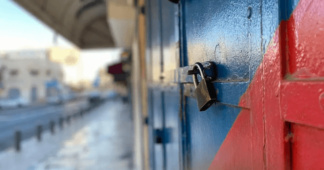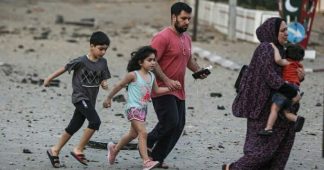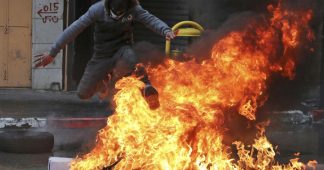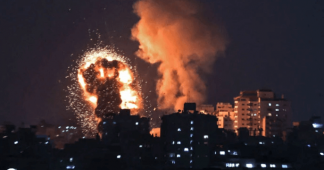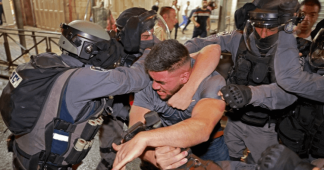By Jean Shaoul
May 19, 2021
The Israel Defense Forces (IDF) responded with brutal repression to a Palestinian general strike across the occupied West Bank and Arab towns in Israel.
The strike, a “day of rage”, was called by the Arab Follow-up Committee to protest the bombing of Gaza and worsening repression in East Jerusalem. The committee urged solidarity “from the sea to the river.”
Supported by both Hamas and Fatah, the ruling party of the Palestinian Authority President Mahmoud Abbas, it was the first by Palestinians in both the occupied territories and Israel. The historic action saw the shuttering of all Palestinian workplaces, businesses, shops and schools.
Security forces responded with lethal force, killing three Palestinians and wounding at least 63 more in the West Bank.
Troops fired tear gas and live ammunition at hundreds of Palestinians burning tyres and hurling stones at the Beit El military checkpoint at Al-Birah near Ramallah, killing one Palestinian and wounding 70 more. Heavy clashes were reported in other towns and cities, including Hebron, Bethlehem, Nablus and Budrus. On Monday, Israeli soldiers had shot and killed a Palestinian teenager at the al-Arroub refugee camp, north of Hebron, preventing ambulances reaching the 18-year-old Obaida Akram Jawabra, while on Tuesday soldiers killed Fayyad Zahda in Hebron, claiming he was carrying weapons.
In East Jerusalem, police used water cannon to disperse protesters in Sheikh Jarrah. They cracked down violently on protesters inside the Old City and around the Damascus Gate. Middle East Eye reported that Israeli police beat, pepper sprayed and removed the hijab of one of its correspondents, Latifeh Abdellatif, while she was filming the detention of a young boy. When Palestinians stepped in to protect Abdellatif, leading to scuffles with the police, several of them were arrested. Later, Israel’s police commissioner Yaakov Shabtai said his forces had restored calm after “riots in the Arab sector.”
Israel renewed its criminal bombardment of Gaza’s defenceless Palestinians early Tuesday morning, firing 100 bombs and missiles against 65 targets described as a network of tunnels. Several buildings in Gaza city, including a six-storey block housing the Islamic University, were hit. It brings the total number of airstrikes since May 11 to 1,500.
Prime Minister Benjamin Netanyahu acknowledged international pressure for a cease-fire, but “all in all, we are receiving very serious backing, first of all from the US.” US President Joe Biden has refused to call for an immediate halt to the war, reluctantly stating Monday evening he now “supports” a ceasefire but with no timetable. Asked whether a ceasefire was being discussed, a senior Israeli official said, “There is no such thing right now. There is no negotiation. There is no proposal. There is nothing on the table.”
Brig.-Gen. Hidai Zilberman, for the IDF, said there was no plan to suspend operations. “We will hit anyone who belongs to Hamas, from the first to the last.”
The IDF had struck the homes of 12 senior Hamas commanders in the previous 24 hours and killed at least 160 members of Hamas and Islamic Jihad, branded as “terrorists,” since the start of Operation Guardian of the Walls.
According to Gaza’s Health Ministry, eight days of Israeli airstrikes have killed at least 212, including 61 children and 34 women, and wounded over 1,500. Two Thai workers, living in unprotected mobile homes, were killed and seven others injured in a rocket attack that hit a packaging plant in southern Israel, bringing the total number killed in Israel to 12 and 300 wounded in rocket attacks from Gaza.
According to the United Nations Office for the Coordination of Humanitarian Affairs (OCHA), the air strikes have destroyed or badly damaged nearly 450 buildings, displacing more than 58,000, of whom 47,000 have been forced to seek shelter in 58 UN-run schools in Gaza. At least 24 schools have been either damaged or ordered to close, forcing 600,000 students to miss out on schooling.
The Ministry of Information estimated that $18 million damage has been done to streets and infrastructure. Some 132 buildings have been destroyed and 316 severely damaged, including six hospitals and 13 healthcare clinics, as well as a desalination plant, affecting access to drinking water for 250,000 people. Water pipes serving at least 800,000 people have been damaged. Trash is piling up in the streets.
Gaza’s limited healthcare system has been crippled. Two leading doctors have been killed. There is less than a month’s supply of 46 percent of essential drugs and 33 percent of essential medical supplies. On Monday, an Israeli air strike nearby put the only laboratory that processes COVID-19 test results out of action. With thousands of Palestinians, most of whom are unvaccinated, crowding into schools for shelter, there are fears that these schools could become mass spreaders of the disease.
The same day, another air strike hit the Qatari Red Crescent Society office, which carries out relief work in Gaza, killing two Palestinians and wounding 10 others. It followed attacks on ambulance crews, including a Médecins Sans Frontieres (MSF) crew, and health facilities, leaving a sterilization room unusable and a waiting area damaged. Hellen Ottens-Patterson, the head of MSF’s mission in Palestine, said the pattern of Israeli bombings was far greater than previous campaigns. “Emergency health workers are taking incredible but necessary risks to move around… our teams were confronted with serious injuries caused by the Israeli police to men, women and children.”
Health officials have called for the protection of medical staff and facilities, saying Israeli air strikes are hindering their ability to help victims and warning that a prolonged war would have devastating humanitarian consequences. People have taken to social media to lambast the Israeli military for their targeting of key roads and accessways that have prevented ambulances from reaching healthcare centres and hospitals, including the main al-Shifa hospital.
Despite the dire humanitarian situation, international aid organisations are finding it difficult to send in aid as the three entry points have been closed since May 11. Israel closed the Karam Abu Salem crossing into Gaza shortly after opening it, under pressure from the UN, to allow in donated humanitarian goods, after an Israeli soldier was slightly wounded in a mortar attack near the crossing. Karl Schembri, the Norwegian Refugee Council’s media adviser for the Middle East, told Al Jazeera that Gaza would be “suffocated” if the Keram Abu Salem and Beit Hanoon (Erez) crossings remained shut.
On Monday, Israeli ground troops opened up a second front, firing shells into southern Lebanon after rocket fire was launched, apparently by a small Palestinian group in Lebanon, not by Hezbollah. This was the second harmless rocket attack since May 11 from Lebanon, which is home to hundreds of thousands of Palestinians. Both the Lebanese army and the UN Interim Force in Lebanon (UNIFIL) intensified their patrols along the border “to prevent any further incidents that endanger the safety of the local population and the security of southern Lebanon.”
The IDF said its forces had downed a drone approaching Israel’s border with Jordan, without saying where it had come from, amid speculation it might have come from Syria.
Protests in support of the Palestinians have continued in Lebanon, while tens of thousands turned out in a rally in Sana’a, Yemen’s capital.
Published at www.wsws.org
